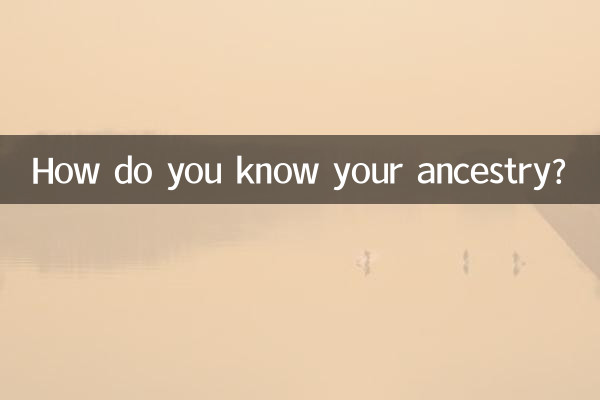How do you know your ancestry?
In recent years, with the popularization of genetic testing technology and people's curiosity about their own cultural roots, "how to check one's own ancestry" has become a hot topic. Whether through genetic testing tools or family history research, knowing one’s ancestry not only satisfies curiosity but also helps people better understand their cultural identity. This article will combine the hot content of the past 10 days to provide you with structured data and analysis.
1. Recommendation of genetic testing tools

The following are the mainstream genetic testing tools currently on the market and their characteristics:
| Tool name | Detection range | price range | Popularity |
|---|---|---|---|
| 23andMe | 200+ regions around the world | $99-$199 | ★★★★★ |
| AncestryDNA | 500+ regions around the world | $99-$149 | ★★★★☆ |
| MyHeritage | 42 ethnic groups around the world | $79-$199 | ★★★☆☆ |
| WeGene | Mainly Asian people | 499-999 RMB | ★★★★☆ |
2. Common methods of ancestry research
In addition to genetic testing, there are many other ways to learn about your ancestry:
1.family history research: Trace the origin of your ancestors through family trees, genealogy, family legends, etc.
2.Surname research: Many surnames are associated with specific regions or ethnic groups, and ancestry can be inferred through surname origin research.
3.cultural traditions: Cultural characteristics such as customs passed down by the family and ways of celebrating festivals can also provide clues to ancestry.
4.Linguistic analysis: The dialect or specific vocabulary used by a family may reflect a particular ethnic background.
3. Recent hot bloodline topics
According to network data analysis in the past 10 days, the following are the bloodline-related topics that are currently receiving the most attention:
| topic | Discussion popularity | Main platform |
|---|---|---|
| Genetic diversity among Asian populations | 85% | Weibo, Zhihu |
| European aristocratic ancestry verification | 72% | Twitter, Reddit |
| Native American ancestry protection | 68% | Facebook、TikTok |
| African ancestry tracing project | 65% | Instagram, YouTube |
4. The psychological impact of ancestry cognition
Research shows that knowing your ancestry may have the following psychological effects:
1.Enhanced identity: 89% of the survey respondents said that they have a clearer understanding of their cultural identity after learning about their ancestry.
2.Increased sense of family connection: 76% believe ancestry research enhances emotional connections with family.
3.Increased cultural interest: 63% of people started to learn the language or traditional culture related to their ancestry.
4.health concerns changes: 41% of people have adjusted their lifestyle or physical examination items based on ancestry risk.
5. Ethical considerations in ancestry research
When pursuing the truth about ancestry, the following ethical issues also need to be considered:
| Question type | incidence | Solution suggestions |
|---|---|---|
| Risk of privacy leakage | 32% | Choose a reputable testing agency |
| identity crisis | 18% | Seek psychological counseling support |
| Family secrets exposed | 12% | Communicate with family members in advance |
| Possibly culturally offensive | 9% | Respect different cultural traditions |
Conclusion
Learning about one's ancestry is a journey full of surprises, whether through modern technology or traditional research methods, and the most important thing is to approach the results of discovery with openness and respect. Bloodline is only a part of personal identity. True self-identity comes from understanding and accepting multicultural backgrounds.
When conducting ancestry research, it is recommended to combine multiple methods, focusing on scientific data as well as family oral history and cultural heritage. At the same time, we must pay attention to protecting personal privacy, treat test results rationally, and avoid falling into misunderstandings such as the theory of blood superiority.

check the details

check the details